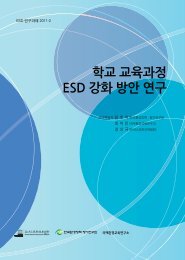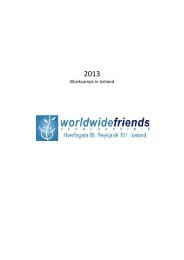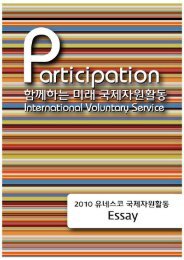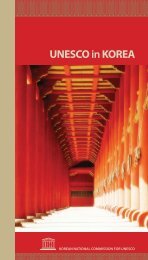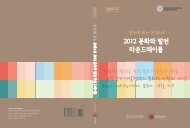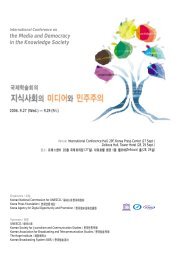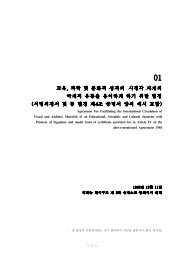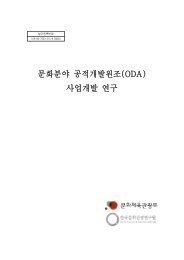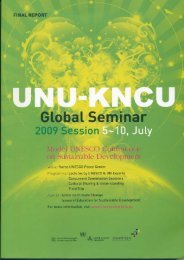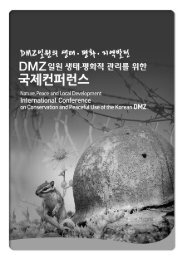Untitled
Untitled
Untitled
Create successful ePaper yourself
Turn your PDF publications into a flip-book with our unique Google optimized e-Paper software.
adaptation to Korean society should be introduced. Furthermore, spousal education<br />
for understanding the cultural differences of migrants and communicating with them<br />
and education for multicultural family members can be made into programs at the<br />
same time. Through these educations, we can consider a measure to facilitate<br />
migrants to become cultural mediators and to be trained to be multicultural<br />
education lecturers equipped with multicultural competency. Next, a means must be<br />
developed to empower multicultural competency of professionals from institutions<br />
implementing national policies to smoothly promote policies responding to<br />
multicultural settings. In addition, and above all, concrete policy plans must be<br />
sought for providing social services that grasp the life cycle of marriage migrant<br />
women and regional demands considering a multicultural reality suitable for<br />
progressing into a multicultural society. In the extended study, we take a look at<br />
public education and the development of contents of programs, which will be used<br />
in multicultural education in daily life, direction for policy development in the future,<br />
and social services suitable for multicultural surroundings.<br />
5. Conclusion<br />
This is a prime time to prepare for transitioning into a multicultural society on a<br />
large scale. At this time, we should guarantee human rights of migrants and find a<br />
way to make and practice diverse institutional and practical measures to resolve<br />
problems of discrimination and inequality due to racial and cultural differences,<br />
including guaranteeing the right to live. Additionally, multicultural policies should be<br />
systematically established with long-term vision as well, which is related to a change<br />
in perception of the general public who will be in contact with migrants with racial<br />
and cultural differences in the real world at the everyday level, and it should also be<br />
related to promoting cultural openness.<br />
Success or failure in transitioning to a successful multicultural society depends<br />
on diverse factors. The very first step forward in transitioning to a successful<br />
multicultural society that recognizes and respects racial and cultural differences is<br />
having tolerant attitudes towards others with differences, taking the differences not<br />
as discrimination but as diversity, reflecting on one’s own cultures or values. It is<br />
because practices carried out in daily life, which is just as important as those in legal<br />
and institutional frameworks, is significant in genuine multiculturalism, which aims<br />
for all members of society to not experience discrimination and inequality because of<br />
racial and cultural differences. Taking this into account, multicultural policies in the<br />
future should go a step forward not by mere “consideration” of minorities but by the<br />
encouragement of awareness that differences in minorities can become a new asset<br />
and social tolerance can become an impetus for generating creative cultures. All<br />
these processes are part of the new multicultural empowerment process as well.<br />
ESD basically shares the same goal with multicultural empowerment of multicultural



